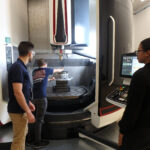An airside hydrogen refuelling trial, led by easyJet and supported by several cross-industry partners, has been successfully completed at Bristol Airport – the first airport trial of its kind at a major UK airport.
Hydrogen was used to refuel and power ground support equipment (GSE) – specifically, baggage tractors – servicing easyJet passenger aircraft. Conducted as part of the airline’s daily operations, the trial demonstrates that the gas can be safely and reliably used to refuel ground equipment in the busy, live airport environment.
The trial, dubbed Project Acorn, was in development for over a year and involved many other leading organisations from across aviation, engineering, logistics and academia. These include Cranfield Aerospace Solutions, Cranfield University, Connected Places Catapult (CPC), DHL Supply Chain, Fuel Cell Systems, the IAAPS research institute, Jacobs, Mulag and TCR.
The group intends to use the outputs of the trial to help develop industry best practice standards, provide guidance to airports, airlines, local authorities and regulators on required infrastructure changes, and support the development of a regulatory framework for hydrogen’s use on an airfield – standards which, due to hydrogen’s nascency in aviation, do not currently exist.
The data and insights gathered will also feed into research that groups like Hydrogen in Aviation (HIA)* are conducting to ensure UK infrastructure, regulatory and policy changes keep pace with the technological developments in carbon-emission free flying. It also supports the work and ambitions of other bodies such as Hydrogen South West (HSW) and the Hydrogen Innovation Initiative (HII), the latter having also co-funded the project.
David Morgan, Chief Operating Officer at easyJet, said: “It’s without doubt that hydrogen will be an important fuel of the future for short-haul aviation, as demonstrated by the rate of innovation we’re seeing.
“While the technology is advancing at an exciting pace, as hydrogen isn’t used in commercial aviation today, there is currently no regulatory guidance in place on how it can and should be used, and so trials like this are very important in building the safety case and providing critical data and insight to inform the development of the industry’s first regulatory framework. This will ensure regulation not only keeps pace with innovation, but importantly also supports the industry in meeting its decarbonisation targets by 2050.”
Tim Johnson, Director for Strategy, Policy and Communications at the Civil Aviation Authority, comments: “Projects such as this are cornerstones of our commitment to support innovation and decarbonisation in the industry.
“This trial will serve as the basis of a White Paper which we will also be contributing to, as well as allow for the creation of further safety guidance and regulatory standards for the use of hydrogen in aviation.
“We look forward to helping nurture this seed of the future greener aviation sector as it continues to grow.”
Anthony Browne, Aviation Minister, comments: “Project Acorn is a great example of the UK aviation sector pushing the boundaries of what’s possible – using leading engineering to make decarbonisation a reality from the ground operation to the planes themselves.
“Innovative projects like this are crucial to achieving our target, set out in the Jet Zero Strategy of zero emission airport operations by 2040.”
Subscribe to the FINN weekly newsletter
You may also be interested in
Bristol Airport seeks temporary worker supplier

